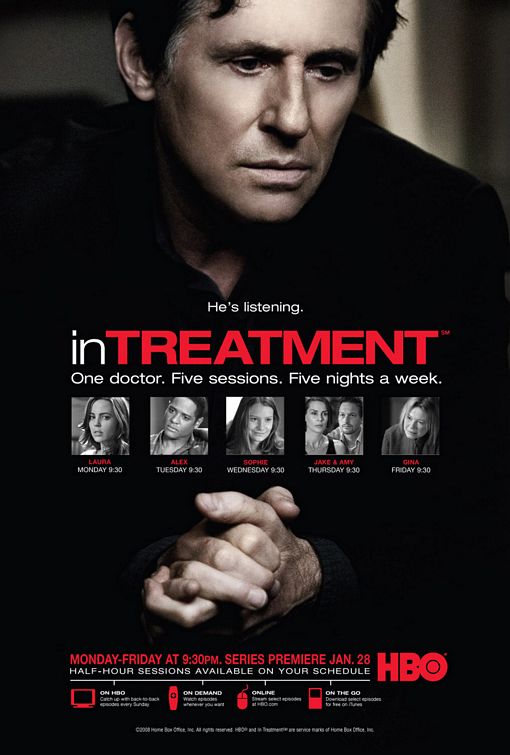 In Treatment: Season 1
In Treatment: Season 1HBO
I'm just now finishing the last two episodes of the first season of HBO's In Treatment. In short, it is a show about therapy. Gabriel Byrne plays Paul, a therapist with a private practice based in his house. For the first season, we are privy to four different sets of patients: Laura (Melissa George), a doctor who's been seeing Paul for a year before the show starts; Alex (Blair Underwood), a Navy pilot who comes to Paul after discovering that a target he hit was mistakenly identified as a terrorist stronghold when it was a school building; Sophie (Mia Wasikowska), a sixteen-year-old gymnast who needs a professional opinion from Paul after an accident; and, Jake (Josh Charles) and Amy (Embeth Davidtz), a couple trying to decide if they want another child. These episodes are delivered in week-long groups of five episodes. In the fifth episode of each week, Paul goes to see Gina (Dianne West), a retired therapist, becoming a patient himself.
You have to watch the whole season. You really do. Laura is irritating at first. Alex is arrogant and unlikable. Sophie's a brat, albeit an engaging one. Jake & Amy are the worst; their life seems like a soap opera, and they contain within themselves almost no personality whatsoever. Paul seems like a cool guy, until we learn he's a self-absorbed narcissist in the fifth episode. Consider that we start the show with all of these people in such a state, and, yet, by the end of the season, I'm sad to see everyone go. You spend 43 episodes getting to know all these individuals, getting to know everything about them. I know these people better than I know any of my friends. That's the idea, of course, and it's brilliant. I could never be a therapist. Getting to know people on such a level, and then having them just walk away, it would destroy me.
The information is given out in bits and pieces. You work for it. There are very few major revelations; only small ones. But there are many of them, and they are all staggering, and that is because they are all real. These are fictional characters, yes, but they are so thoroughly constructed, and so brilliant portrayed (It is easily the best across-the-board acting I have ever seen in any filmed medium), that you feel them as real. Week Nine is shorter, with only three episodes; two of them "wrap up" (I put it in quotes because this show is too wise to wrap everything up neatly, it only does so just enough to allow you to move on) Sophie's sessions and Jake & Amy's, and the third is a final session (for this season) with Gina. Throughout all three of those episodes, I was glued to the screen. I could not look away.
Television has rapidly reached a level of sophistication, to the point where I don't think anyone with an informed opinion can call it a lesser medium; it is capable of doing things a feature-length film could never (and should never) do. With shows like The Wire, intricate stories of incredible breadth and depth, with massive scope and huge, detailed casts, can be told without concern for overwhelming the audience. With shows like In Treatment, we can come to know and even care about people in ways that are impossible with only two hours of exposure. We are truly in the golden age, people. Soak it up.
Grade: A


